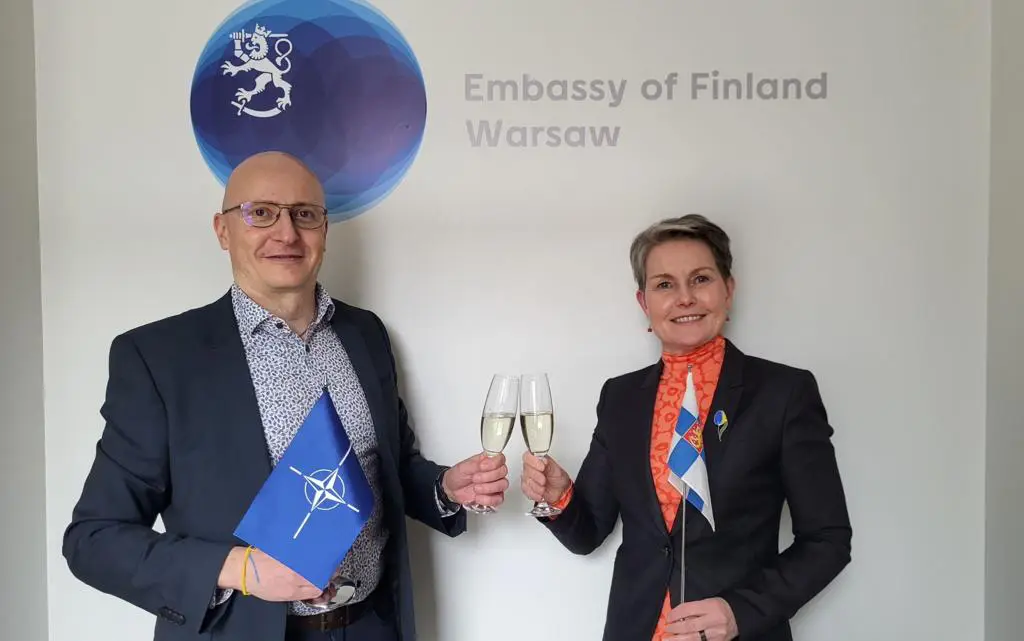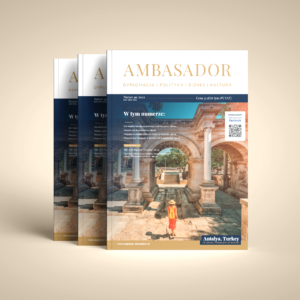NATO is an alliance of European countries with North American countries. The organisation creates a unique bond between the two continents that enables consultation and cooperation in the fields of defence and security, as well as the joint conduct of international crisis management operations. NATO’s main objective is to guarantee – by political and military means – freedom and security for all member states.
When did Finland officially become a full member of the North Atlantic Alliance?
NATO, in accordance with Article 10 of the Washington Treaty, applies an ‘open door’ policy towards countries seeking membership. Countries that are party to the Treaty can invite any European country to join the Alliance. Although NATO membership requires a seven-stage process we have managed to pass through all stages quickly. On 4 April 2023, Finland joined NATO. We received an invitation from NATO member states on 29 June last year. We had accession discussions for only one day and already signed the accession protocol on 5 July.
What was the procedure for Finland’s accession to NATO?
The first step on the road to NATO was a meeting in Brussels between NATO experts and representatives of our country. The purpose of the talks was to prepare Finland for membership – to fulfil the economic, military, legal, political and intelligence obligations of membership in the Alliance. In May 2022, the decision was made to apply for membership in the Alliance without delay. The 2022 NATO Summit in Madrid opened the way for the signing of the protocols enabling accession and the start of their ratification by the Allies. Finland’s accession to NATO was possible after ratification of the accession documents by all NATO member states in accordance with their national laws and procedures. After that, only the official part remained and on 4 April we could celebrate the official entry into NATO. Less than a year passed between the formal application and full membership.
Why did Finland decide to apply for NATO accession?
Until recently, the Finns argued that, as Finland is a small country in terms of population, located in the North of Europe, it would be better to take care of our own security. There were also historical reasons for this decision. The Winter War with the Soviet Union in 1939-40 made us realise that we had to rely on ourselves, as the help we received from Europe was insufficient. For these reasons, for a long time only 25% of the Finnish population supported the idea of joining NATO.
After Russia’s aggression against Ukraine, the Finns immediately imagined that they could find themselves in the place of the Ukrainians. We are a neighbouring country to Russia. Our common border is 1,343 km. Through family stories told from generation to generation, we remember the war with Russia. Now the world situation is different, war technology is very advanced, so the Finns have understood that we need outside support. This change in our previous attitude happened practically overnight. As much as 80 per cent of the Finnish public supported Finland joining NATO after Russia’s aggression against Ukraine. When it came to the parliamentary vote, 184 out of 200 MPs voted in favour, only 7 against.
Finland requested accession jointly with Sweden. What stood in the way of joint entry into the Alliance?
We are very close countries, allies and partners. Finland belonged to Sweden for hundreds of years, it was not an occupation but rather a shared history. In addition, we are northern European countries, Nordic countries that were not part of NATO, so this decision to enter together was natural. In Sweden, the threat from Russia was similarly assessed. If both countries belong to NATO then the increased security in the Nordic-Baltic region will be more complete. Therefore, the desire for joint entry into NATO was entirely justified.
The 28 countries ratified the membership of Finland and Sweden very quickly. Poland was among the first and for that we are grateful. And then there were problems with Hungary and with Turkey. Ankara made demands on the fight against terrorism and blocked the start of negotiations. For several months there were talks between Turkey, Finland and Sweden in a working group to discuss the problems that had accrued. At a certain point it was already clear that Turkey had more comments to make to Sweden than to Finland. We then decided that it would be better if at least Finland joined the ranks of NATO first, because we are the ones who share a border with Russia.
At the same time, we emphasise all the time that as long as Sweden is not in NATO, it is not full membership.
When do you think Sweden will join NATO?
We all want this decision to be made as soon as possible. The NATO summit in Vilnius this month gives hope that the process of Sweden’s admission to the Alliance will accelerate. Now the decision is in the hands of those countries that have not yet ratified Sweden’s membership. The Finnish Parliament has done so since it joined NATO, in order to give Sweden support and show all other member states that our neighbour is ready for this step.
How do you assess Poland’s role in Finland and Sweden’s accession to NATO?
As I mentioned earlier, Poland was one of the first countries to ratify our membership. Even before the process started, Poland expressed that it would like to ‘see’ both Finland and Sweden in NATO. Poland was very active and did everything in its power to support us. We sincerely thank them for that.
What does Finland’s accession to NATO mean for Finland and Europe as a whole? What will be the strategic, military and political consequences of this accession?
The primary consequence of Finland’s entry into NATO is a significant strengthening of security. Finland has a long border with Russia, and now that we are a member of the Alliance, NATO has twice as long a border with Russia as before. Some argue that this could be a threat to NATO. We try to explain that we have a strong army and are ready to defend our border. After the Second World War, Finland in a sense never laid down its arms. Our confidence in our neighbour was not at a high level, so we started immediately after the war to rebuild the country by preparing it for any crisis. General conscription was introduced, which now lasts six or eleven months, followed by cyclical training. The whole population is prepared, they know what to do if a crisis occurs. Our army, including the reserve, numbers 280,000. In Finland, the willingness to defend the country is at a very high level and, according to surveys, is one of the highest in the world.
When it comes to preparing the state for crises, we have a concept of holistic defence of the country. A small nation next to a ‘big bear’ must strategically and comprehensively prepare for defence.
This means preparedness not only in terms of the military. At the national and regional level, courses are being organised in which people from various sectors of the economy are invited to participate. The highlight of these courses, apart from defence preparedness, is networking and
talking about security issues. Companies also get involved in the defence system through the National Emergency Supply Agency – a system for storing critical raw materials, i.e. grain, fuel.
I would also like to mention the shelter system, which we started building after the Second World War. Shelter provisions are guaranteed in our legislation and we are now able to provide shelter safety for almost all Finnish citizens. There are widespread shelters, e.g. metro stations, underground car parks, in addition there are safe shelters in all apartment blocks over 1,200 sq m in area in case of crisis. Storage reserves are accumulated in all types of shelters. According to the law, in the event of an emergency, public places change their use within 72 hours. I think I can use the statement that we are a ‘security producer’. We want to be a very good NATO member and we are prepared to do so.
Finland’s entry into NATO is also politically significant. Not only does it increase the importance of the Alliance, to which most European countries belong, but it also shows Russia that NATO is expanding, although the objective was the opposite. In Finland, we are all closely following what is happening in Ukraine and are very sympathetic.
On an ideological level, on the other hand, it is very important for Finland, as for all Nordic countries, that NATO upholds the values of democracy, the rule of law and human rights.
Interviewed by:
Ada Krzewicka



Sledź nas na: